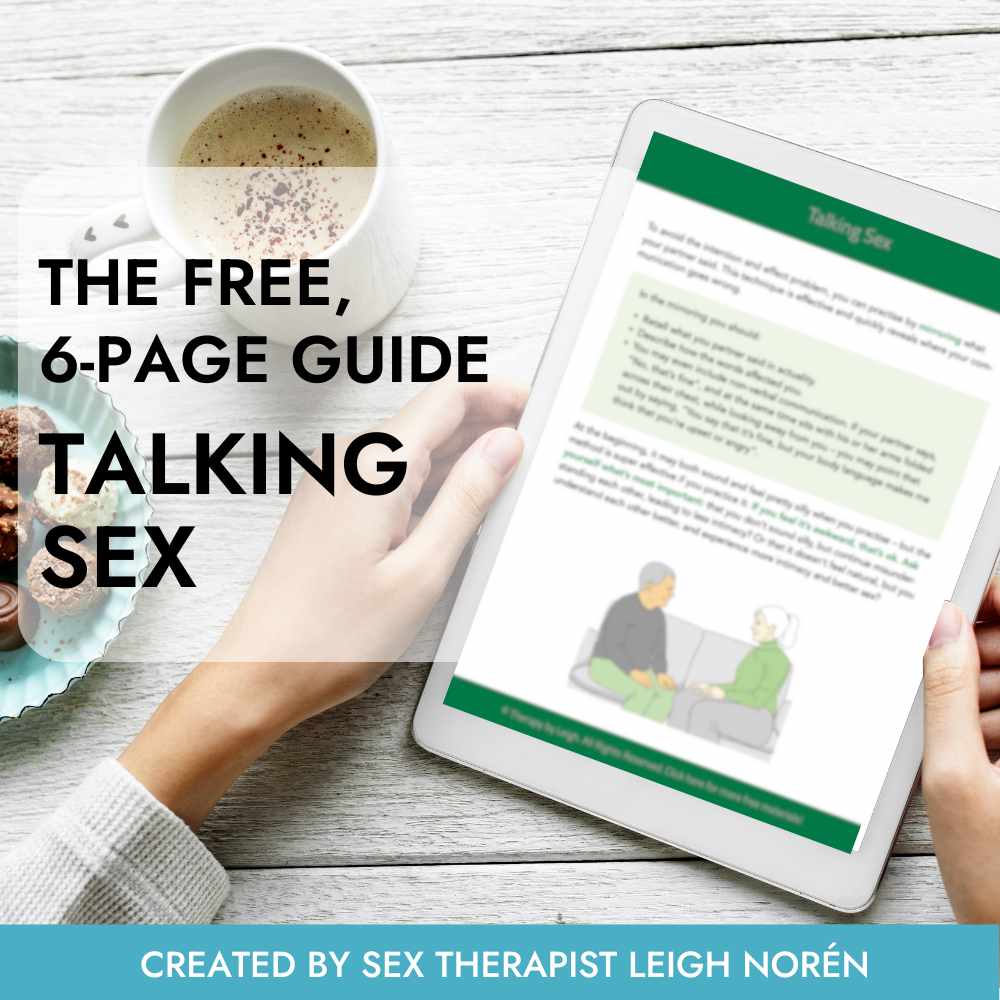One Big Reason Women Can Have Difficulty Having An Orgasm With A Partner
Orgasms – they can be a source of pleasure and well-being – but also a source of sheer hell. When you’re experiencing difficulty having an orgasm, the whole point of orgasms quickly disappears.
It turns sex into a stressful event and makes you feel bad, guilty, or even worthless.
You’re not.
These past few years there has been a huge discussion regarding the orgasm gap. If you don’t know much about it, it might sound like a made-up phenomenon. It is, however, a very real occurrence.
Research shows that heterosexual men on average usually or always have an orgasm 95% of the time, whereas heterosexual women only have one 65% of the time. The numbers are generally better for women in same-sex relationships, showing they orgasm 86% of the time. This seems to point to something going on specifically in heterosexual relationships.
There are lots of reasons for this orgasm gap – an big one is technique and society’s focus on vaginal penetration as “the real sex” – but we’ll leave these factors for another blog post.
In this article, we’ll be focusing on another reason you might be experiencing difficulty having an orgasm. One reason that’s rarely talked about. And one that I as a sex therapist, have found exacerbates or leads to orgasm difficulties – partners.
Particularly partners who really want their significant other to come.
This isn’t a bad thing – in fact, it’s pretty important if you’re aiming for a good and pleasing sex life.
However, a partner who really wants you to have an orgasm can sometimes end up making your orgasm all about them.
Orgasms Aren’t Gifts
We like to talk about our partners “giving” us orgasms. Like they’re gifts that can be doled out. Because of this, orgasms are seen as the responsibility of your partner.
But you’re responsible for your own orgasm – even during sex with a partner.
This doesn’t mean your partner shouldn’t care about your pleasure, or not want to help you get there.
It does however mean you should have knowledge about how you can orgasm and communicate these needs to your partner. By taking responsibility for your own orgasm you’re regaining agency and empowering yourself and increasing the chances you’ll reach the big O.
More tips on how to have an orgasm can be found in my blog post on what to do when you have difficulty achieving orgasm.
When experiencing difficulty having an orgasm during sex – your partner might find their ego being bruised. This is because society imparts the idea that your orgasm is about how well they perform.
This rings especially true in heterosexual relationships, as men are seen as the “truly” sexual ones. Men are meant to perform – and perform well.
Sexual outlets such as porn hammer home this idea in a very explicit way. So it’s no surprise your partner might freak out when they’re not able to “make” you come.
They view your lack of orgasms as a failure on their part – shifting your orgasm from a question of your sexual enjoyment and pleasure – to a question of their performance.
More Pressure Without Orgasms
Your partner might not articulate your difficulty having an orgasm as a failure on their part.
In fact, they’re probably not even aware of what your non-existent orgasm stirs up inside of them.
But you feel the pressure anyway.
And it manifests in different ways.
For example a lot of women find themselves not being able to concentrate during sex. Thoughts like “I need to come this time or he’ll be upset”, or “she looks stressed now because I’m not coming” or “maybe I should fake it” end up being the only things you can focus on.
Because of this, you find yourself not very interested in sex at all. It’s become yet another arena in life where you have to work, try hard, and please.
And when you’re not feeling horny and sexual arousal isn’t on the cards, your orgasm usually become impossible. This partly explains why some women find it increasingly difficult to climax, the more sex they have with their partner.
For others, difficulty having an orgasm becomes a bigger deal when the sex is over. There’s the awful sinking feeling in the pit of your stomach. You feel like you’re broken, weird, abnormal.
This isn’t true.
And these feelings can be further exacerbated if the weight of your partner’s insecurities and sadness is relayed to you. Their words etch themselves into your brain.
It now becomes painfully clear that you need to orgasm in order to please them. It’s like your right to sexual pleasure disappears – the more important it becomes to your partner.
Have you grabbed your free resource yet?

My free resource, Talking Sex, helps you and your partner reduce conflict and misunderstandings about sex.
Download the guide, and you also get instant access to my deeply appreciated weekly newsletter. You can unsubscribe at any time.
Pleasure Is The Goal
It’s easy to place all of the blame on your partner. But it’s important to try and find compassion for your partner’s feelings as well as your own. They probably didn’t choose to feel this way.
Society places a huge emphasis on orgasms. For many, orgasms are seen as the goal of sex. They’re the ultimate testament to pleasure having taken place. This not only affects you – it affects your partner too.
The problem with having this as a goal is that it becomes very obvious when you’re not hitting your target. When the only goal of sex is to have an orgasm – it quickly turns sex into a less pleasurable experience and into more of a task to be completed.
Pleasure without orgasms also count as enjoyable experiences. And I’m not just saying this, so hear me out.
Sex is about letting go, having fun and immersing yourself in the experience. It’s about enjoying it wholeheartedly, and connecting with the other(s).
This can happen without orgasms.
What You Can Do If You Have Difficulty Having An Orgasm With Your Partner
When you can come on your own but not with your partner it can place a lot of pressure on you. If this sounds like you, trying out the suggestions below will be paramount in order to remove the pressure and enjoy sex.
Talk about the pressure with your partner.
Let them know how you’re feeling about it, but don’t tell them it’s all their fault. You want to solve this together so you can have a pleasurable sex life together – and starting in the area of blame won’t get you there.
Let your partner know how you’re feeling and what you need from them in order to have an orgasm (if that’s what you want) or in order to remove the pressure.
This can be a difficult subject to navigate as sex is a sensitive area. If you want more actionable advice on talking about sex you’ll find it in this piece on communication in relationships and how to talk to your partner about sex.
Try removing orgasms as the goal.
By removing that which pressures you – you can begin to enjoy sex and immerse yourself in the experience.
This doesn’t mean you’re never going to have an orgasm with your partner or that you’re not allowed to have one. It simply means you’re trying out a technique that allows you to connect with your partner instead of being stuck inside of your head.
When the pressure is gone and you’re not meant to have an orgasm, you might, paradoxically, find yourself having one.
If you’re experiencing difficulty having an orgasm with a partner and want more actionable expert advice on how to have one, this article on difficulty orgasming will help you get there.

Zero sex drive?
You’re not alone! Download the 10-page Desire Test to find out why your desire for sex is gone (and what to do about it).
Questions based on a variety of factors proven to negatively affect desire
Find out which factors are responsible for your low or non-existent sex drive
Get instant access to expert advice, delivered directly to your inbox when you download The Desire Test. Unsubscribe anytime.
WANT TO KNOW MORE ABOUT THE DESIRE TEST?
With 9 years of experience as a sex therapist and coach - Leigh helps her clients create stress-free, shame-free, pressure-free sex lives, through her unique combination of sexological science, & psychotherapeutic & coaching tools.
OTHER POSTS YOU MIGHT ENJOY
Copyright © 2019-2026 Leigh Norén. All Rights Reserved. | Website by Pinegate Road
Cookie policy | Terms & Conditions | Privacy Policy


